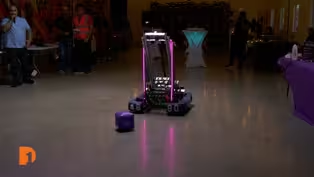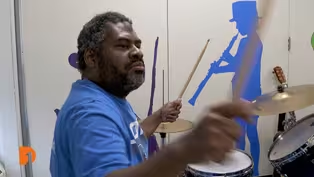
Curtis Chin’s new book shares history of Chung’s restaurant
Clip: Season 8 Episode 15 | 15m 11sVideo has Closed Captions
Curtis Chin’s new memoir chronicles the life lessons he learned in a Chinese restaurant.
In the heart of Detroit's bygone Chinatown, a vibrant oasis once thrived and diverse patrons, from celebrities to everyday families, shared more than just meals at Chung's restaurant. Curtis Chin, a Detroit native, author and activist, takes readers on an evocative journey through his upbringing in Detroit's former Chinatown in his book, "Everything I Learned, I Learned in a Chinese Restaurant.”
Problems playing video? | Closed Captioning Feedback
Problems playing video? | Closed Captioning Feedback
One Detroit is a local public television program presented by Detroit PBS

Curtis Chin’s new book shares history of Chung’s restaurant
Clip: Season 8 Episode 15 | 15m 11sVideo has Closed Captions
In the heart of Detroit's bygone Chinatown, a vibrant oasis once thrived and diverse patrons, from celebrities to everyday families, shared more than just meals at Chung's restaurant. Curtis Chin, a Detroit native, author and activist, takes readers on an evocative journey through his upbringing in Detroit's former Chinatown in his book, "Everything I Learned, I Learned in a Chinese Restaurant.”
Problems playing video? | Closed Captioning Feedback
How to Watch One Detroit
One Detroit is available to stream on pbs.org and the free PBS App, available on iPhone, Apple TV, Android TV, Android smartphones, Amazon Fire TV, Amazon Fire Tablet, Roku, Samsung Smart TV, and Vizio.
Providing Support for PBS.org
Learn Moreabout PBS online sponsorship- [Narrator] Coming up on One Detroit.
In recognition of Hispanic Heritage month, we'll examine the future of work in the technology field for Detroit's Latino community.
Plus, a new memoir Details the life lessons learned growing up in a family-owned Chinese restaurant.
Also ahead, we'll see how a local nonprofit uses creative arts therapy to bring out the talents of individuals with disabilities.
And we'll give you some ideas on how to spend this fall weekend in metro Detroit.
It's all coming up next on One Detroit.
- [Announcer] From Delta Faucets to Behr Paint.
Masco Corporation is proud to deliver products that enhance the way consumers all over the world experience and enjoy their living spaces.
Masco, serving Michigan communities since 1929.
Support for this program is provided by: The Cynthia and Edsel Ford Fund for Journalism at Detroit Public TV.
- [Announcer] The DTE Foundation is a proud sponsor of Detroit Public TV.
Among the state's largest foundations committed to Michigan focused giving.
We support organizations that are doing exceptional work in our state.
Visit DTEFoundation.com to learn more.
- [Announcer] Nissan Foundation.
And viewers like you.
(low tempo music) - [Narrator] Just ahead on this week's One Detroit.
Curtis Chin talks about his experience as a child growing up in his family's popular Detroit business, Chung's Restaurant.
Plus an organization that helps people with disabilities discover their creative talents is preparing for a very special event.
And Peter Wharf and Dave Wagner of 90.9 WRCJ run down a list of entertaining activities you may be interested in this weekend.
But, first up, our coverage of National Hispanic Heritage Month continues now with the future of work report on Hispanic-American representation in the technology industry.
A recent Southwest Detroit event celebrated the city's Latino business owners in the tech and digital world.
One Detroit contributor, Bryce Huffman, was there and reports on the successes and challenges facing the city's Latino community when it comes to careers in tech.
- The idea of being more proactive instead of reactive, and realizing the opportunities that are on the table with all the new technology- - [Narrator] Here, at the Detroit Hispanic Development Corporation, on the city's southwest side, several local organizations came together to celebrate and promote Latino businesses.
Anita Zavala, the Entrepreneurship and Wealth Building Director at DHDC, says The Latin-X-Tech event is all about highlighting Latinos and Latinas working in the technology field.
- This event specifically is designed to show our community that we can do more than just, not that there's anything wrong with owning a restaurant, or selling jewelry, or candles, but we do have a place in tech.
And there are already members in our community who are succeeding in the tech space.
- [Narrator] The DHDC, Tech Town Detroit, the Detroit Economic Growth Corporation, Detroit Means Business, the Southwest Detroit Business Association, and more joined forces to make this event possible.
It included live music, food vendors, panel discussions, and guided business development sessions.
There was even a local school robotics presentation.
But why focus on the tech industry?
Zavala says, it's simple, tech is where the money is.
- I want as many members of my community as possible to get into businesses that have the potential for millions of dollars, and not just hundreds of thousands.
- [Narrator] But getting Detroit's Hispanic community into this field has some barriers.
One that DHDC and other organizations are fighting, Zavala says, is a lack of technology education.
She says many of Detroit schools don't have coding or other tech programs.
- Our schools don't have the funding for those type of programs.
So, a lot of our community didn't grow up with it outside of, like, their phone or their tablet.
That's about it, right?
And then, our older members of our community, they didn't even have that.
- [Narrator] For Zavala, this event is about celebrating ways Detroit's Latino residents have already begun overcoming that barrier.
The Robotics Engineering Center of Detroit, or RECD, is a youth robotics program held at the DHDC.
- We host ten high school robotics teams for first robotics here.
And those high school teams from our community they share all of the machining equipment that they would need to build those robots.
- [Narrator] Zavala watched RECD's demo during Latin-X-Tech.
She was reminded of how great robotics was for her son.
- It really helped him gain confidence.
Technical skills that he uses still to this day.
- [Narrator] Another huge barrier for many in southwest Detroit is language.
Many in the city's Hispanic community are not native English speakers.
- Detroit is a culturally rich city, right?
While the majority population is black American, we have linguistically so many different cultures and languages that are representative.
- [Narrator] This is Jesse Feliz, the founder and lead educator of Spanish Swag, a Spanish language learning program for kids.
Feliz understands how important it is for Latin Detroiters to understand English speakers and vice versa.
- In order to function in this diverse, ever changing world, we're competing on a global scale.
So, we do, it's not about code switching, but it is about navigating this world in a bilingual, multilingual way.
- [Narrator] Another barrier is the current lack of Latino representation in these jobs.
We sat down with Eddie Gonzalez, founder of Eye Breathe Design, a local graphic and website design company.
Gonzalez was the keynote speaker for Latin-X-Tech.
- Representation is always a big deal, regardless of the sector or the background, you know, just having someone there that can, you know, speak to the cultural differences and just the opportunities that are on the table for people, I think is a huge deal.
- [Narrator] Beyond understanding technology for all the good it can do in the city, Gonzalez thinks there is a lesser discussed reason that Latino representation matters.
- The fact is, that a lot of this technology is being used to surveil us and to criminalize us in different ways.
And so, I think it's super important that we're at the table to understand like how these technologies are interacting with us on the day to day.
- See, you got the potatoes.
You got the beef, you got the plantains, and you got the mayo-ketchup.
- Oh, yes, thank you, man.
Thank you.
- You're welcome.
- [Narrator] Beyond big scale surveillance equipment or high-end coding needs, most businesses rely on technology to some degree.
Even food popups, such as Puerto Rican restaurant, Mikey's Cocina.
I sat down with owner Miguel Mendez Roman during Latin-X-Tech.
He said he and his team move their business through social media platforms, such as Facebook and Instagram.
- Because you wanna be able to not only reach the local, you wanna go beyond the local, that way everybody know where you at.
You know, what type of food you have, what you serving the community.
- [Narrator] Aside from running Mikey's Cocina, the longtime chef is also the building manager at DHDC.
He credits the organization with helping him and others take their ideas and turn them into thriving businesses.
- I enjoy the business classes with Anita Zavala.
She was the one helping me out to get my LLC, to get my full handler license, so that way we move everything forward.
- [Narrator] Mendez Roman says his dream of being a business owner became possible thanks to DHDC and the organizations they're partnered with.
- They give me the opportunity, and three years later, we still here.
And we still moving.
- [Narrator] For Mendez Roman, events like Latin-X-Tech are all about coming together to build wealth as a community.
- Give to the community.
Get the community together.
Know your community.
Know who's your people.
You know, help to move Detroit forward.
It's time to move up.
- [Narrator] Technology is only becoming more and more interwoven with our daily lives.
So, Feliz believes business owners should embrace what it can offer.
- Tech is here and is here to stay.
And, as a business owner, if you want to, not only like thrive locally, but if you want to scale your business, there's gonna have to be a tech component to it.
- [Narrator] She says it's important for people beyond just business owners.
- Everyone may not open their own business.
Some people are amazing employees.
Everyone may not be the actual creator or founder of an organization.
However, all of us can benefit from strengthening our skills.
And not just consuming technologia, but actually learning it, exploring it, failing with it a little bit, and then progressing with it too.
(crowd applauding) - [Narrator] Let's turn now to Detroit's once thriving Chinatown, at the intersection of Cass and Peterboro.
The area was filled with restaurants, grocery stores, and community centers.
One of the most popular family businesses was the now closed Chung's Restaurant, which was a neighborhood anchor for more than 60 years.
The owner's son, Curtis Chin, has a new memoir coming out about his life as a Chinese restaurant kid.
One Detroit Senior Producer, Bill Kabota, and Contributor, Chin Anyung, have the story.
- [Narrator] Writer activist Curtis Chin's new book, "Everything I Learned, I Learned in a Chinese Restaurant."
It's about growing up in Detroit in the 1980s.
Weaving his family's history running Chung's Restaurant, a community anchor in the now vanished Chinatown area of Cass and Peterboro.
Chin recently visited Metro Detroit to preview his book in a series of Q&As, where we caught up with him.
- I just feel like I was the luckiest kid growing up in a Chinese restaurant.
Yeah, it was really, yeah.
It was really a a good time.
Growing up in a Chinese restaurant, being surrounded by your family, and your friends, and your cousins, eating as much free food as you want.
People always ask me like, well, your title of your book is "Everything I Learned in a Chinese Restaurant," so, what did you learn?
And the first thing that I always say to them is, growing up, a lot of parents tell their kids, "Don't talk to strangers."
But my parents actually gave me the exact opposite advice.
And what they were talking about were the strangers in our dining room.
And so, every time my dad met somebody who came from a different occupation, whether it was somebody worked on the factory line, or they were a doctor, or a newspaper reporter, he would pull us over and say, "Talk to this person."
"Ask them who they are."
"Ask them how they got where they were."
And, because of that, it opened up my eyes to, like, other possibilities in life beyond just working in a Chinese restaurant.
- [Narrator] "For decades, we had been feeding Detroit.
Our fans included celebrities like Smokey Robinson and Joni Mitchell, the Earl of Snowden and Senator Eugene McCarthy."
"We were all good at something."
"Specialized in dumplings and sweets."
"Yaya excelled at barbecue pork and homemade tofu."
"In a cross-cultural twist, my immigrant mom made the best American fair, while my native born dad cooked wonderful dishes from Hong Kong."
Chin's book centers the Chinese community's history and struggles within Detroit's history.
He chronicles his family's journey to Detroit, spotlighting an immigrant story so familiar to so many here, and yet, these stories remain hidden in the city's history.
Chin hopes to change that.
- One of my goals in writing the book was really to weave in my family's history with Detroit.
I think a lot of times you can look at literature and, particularly literature of communities of color, and it comes off as like this sidebar to a main story of America.
And I really wanted to tie in my family's experience, the Asian-American experience, with the city itself, so that you can see that they're intertwined.
That you can't have one without the other.
And that was really important for me.
- Happy Thanksgiving!
- "In Chinatown, though, we followed our own headlines."
"It was all about our Vincent."
"Our workers were beside themselves as they felt such guilt for not being there to defend their friend."
"A stream of ahoos and members of the Online Chinese Merchant Association dropped by with updates from the hospital."
"Emotions ping-ponged by the hour."
"From hope, to dread, and then back to hope."
"It was scary and comforting to see so many faces I hadn't seen in years."
"This time, the elders didn't even bring up my grades or report cards."
"As a shock, Chinatown coped with the untimely loss of one of our own."
"My mind kept returning to Vincent's mom, Lily."
"Her face always had a natural smile."
"And I'd seen her slurping my mom's pork bone soup at the kitchen table in our home."
"But, when I saw her on television, her eyes and mouth read only despair."
"It was rare to see any Asians on TV, much less in public exposing their hurt."
"But Lily epitomized the most universal figure in history, the grieving mother."
"How could anyone hear her anguish and not think of their own mom?"
"I know I thought of mine."
- My book talks a lot about Detroit history.
And, amazingly, a lot of students just don't know about the Vincent Chin case, but they also don't know about things like the Detroit riots, or the rebellion, or even Hudson's department store.
There's this rich history of this city that just is not being covered.
And I, that's why I want to talk about these things, and I want to bring up these consciousness to these people, so that they know the history of the city that they're from.
And I tried to do that with my book.
I weave in a lot of Detroit history.
- [Narrator] "The 1980s in Detroit were tumultuous times."
Trying to understand, accept, and establish my own identity by race, class, and sexuality was difficult, especially when these intersections contradicted and collided."
"The important lessons that guided me through my childhood came served like a big Chinese banquet."
"From the highs of cooking with my mom and dad, to the lows of waiting on some of the rudest customers."
"A chorus of sweet and sour, salty and savory, sugary and spicy flavors that counseled me toward a well led and well fed life."
- [Chin] I grew up in Detroit in the '80s.
It was a really tough time period.
It was not just crack, AIDS.
I knew five people that had been murdered by the time I was 18 years old.
But, at the same time, I loved my childhood.
I thought it was a great time growing up in Detroit.
And I was very fortunate.
I had this wonderful restaurant on the corner of Cass and Peterboro that really provided a nurturing space and taught me a lot of values.
I want to commemorate that.
And so, in my memoir, yes, I do talk about the difficulties of growing up in Detroit in the '80s, but, at the same time, I want readers to walk away and say like, "Yes, but good things did come out of that too."
Detroit Hispanic Development Corporation Latin-X-Tech event
Video has Closed Captions
Clip: S8 Ep15 | 6m 39s | The Pasa la Palabra: Latin-X-Tech event celebrates Hispanic and Latino Americans in tech. (6m 39s)
FAR Friends 2023 event celebrates people with disabilities
Video has Closed Captions
Clip: S8 Ep15 | 6m 53s | FAR Therapeutic Arts & Recreation’s FAR Friends 2023 celebrates people with disabilities. (6m 53s)
One Detroit Weekend: October 13, 2023
Video has Closed Captions
Clip: S8 Ep15 | 2m 5s | Here’s what’s happening around town for Friday the 13th and more on “One Detroit Weekend.” (2m 5s)
Providing Support for PBS.org
Learn Moreabout PBS online sponsorship
- News and Public Affairs

Top journalists deliver compelling original analysis of the hour's headlines.

- News and Public Affairs

FRONTLINE is investigative journalism that questions, explains and changes our world.












Support for PBS provided by:
One Detroit is a local public television program presented by Detroit PBS


